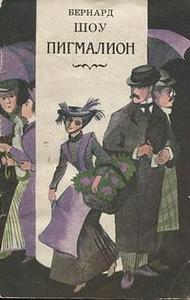You need to sign in or sign up before continuing.
Take a photo of a barcode or cover
i need to play eliza it has to happen i know im not british can we work with this
adventurous
funny
lighthearted
reflective
relaxing
fast-paced
Plot or Character Driven:
A mix
Strong character development:
Yes
Loveable characters:
Yes
Diverse cast of characters:
Complicated
Flaws of characters a main focus:
Yes
I right proper loved this here play, I did. The brashness, the banter, the abrasiveness. 110% liked this ending better than the My Fair Lady take, though it is less theatrical. The dialogue was funny and amusingly harsh, and at play's end you just knew there was no better non-romantic match than Liza and Henry Higgins.
This is exponentially better than the movie version I had watched growing up. I have a great love and respect for Eliza. I'm not a fan of Higgins in the least.
Mr Higgins and Mr Pickering had way too much chemistry between them it was extremely distracting. But when you move that aside and try very very hard to focus on anything else, you learn that this play also explores themes of social class, identity, and the impact of language on social mobility in early 20th-century England. . It challenges conventional notions of class boundaries and highlights the significance of language as a determinant of societal acceptance and opportunity.
Published in 1912, Pygmalion follows the story of Henry Higgins, a phonetics professor, who makes a bet with a colleague that he can transform Eliza Doolittle, a Cockney flower girl, into a refined lady by teaching her proper speech and manners. As Eliza undergoes rigorous training under Higgins, she faces challenges in navigating the complexities of social norms and expectations- and is kind of reminiscent of what we call, these days, code-switching (the practice of alternating between two or more languages or varieties of language in conversation).
Ingeniously, Higgins embodies intellectual arrogance and an unconventional approach to social norms. And Eliza, in turn, represents the working class, navigating the challenges of social mobility and identity transformation. As someone with a very very thick accent, on the borderline being an English dialect, from a very obvious working class, deindustrialised town in South West Wales, I resonated with this character immensely. Ever since I was young, I would hear family and friends talking about how, when they've travelled, people have commented on their accents, trying to correct them, or asking them to speak differently so they were "more understandable". When I moved to Brighton, England, in 2021, I didn't realise how far people would take it.
I've had one person from London tell me, "Sorry, I only speak English" when I asked her a question. I only speak English too. I've had countless times when people have tried to correct my pronunciation and grammar, which where I am from is completely normal, and absolutely nothing could've prepared me for how slow and boring these people talk (Really, I thought that was just something that happens on TV).
And it's not just people who come from more middle-class areas that do this to us. Since I was very young, even in school, teachers would tell us that as we get older we might want to consider taking up etiquette training classes, where they teach you to talk more properly and how to behave more properly, as it gives you a better chance at job interviews and when speaking to important people, etc.
I was disgusted by this, of course, and didn't take their advice, but when I moved to England I realised I might not have a choice but to at least teach myself to speak more "normally". I don't want to feel like I've given in to the idiots and betrayed my family (their words), but I get so tired of repeating myself and stumbling over my words.
OKAY anyway
Pygmalion has, even without my silly experience, had a profound impact on literature, theatre, and popular culture. It served as the basis for the popular musical My Fair Lady and has been adapted into various films and stage productions.
While it is admittedly a little rambly, and for that reason I've rated it 3 stars, this is actually a good book that I highly recommend you check out.
Published in 1912, Pygmalion follows the story of Henry Higgins, a phonetics professor, who makes a bet with a colleague that he can transform Eliza Doolittle, a Cockney flower girl, into a refined lady by teaching her proper speech and manners. As Eliza undergoes rigorous training under Higgins, she faces challenges in navigating the complexities of social norms and expectations- and is kind of reminiscent of what we call, these days, code-switching (the practice of alternating between two or more languages or varieties of language in conversation).
Ingeniously, Higgins embodies intellectual arrogance and an unconventional approach to social norms. And Eliza, in turn, represents the working class, navigating the challenges of social mobility and identity transformation. As someone with a very very thick accent, on the borderline being an English dialect, from a very obvious working class, deindustrialised town in South West Wales, I resonated with this character immensely. Ever since I was young, I would hear family and friends talking about how, when they've travelled, people have commented on their accents, trying to correct them, or asking them to speak differently so they were "more understandable". When I moved to Brighton, England, in 2021, I didn't realise how far people would take it.
I've had one person from London tell me, "Sorry, I only speak English" when I asked her a question. I only speak English too. I've had countless times when people have tried to correct my pronunciation and grammar, which where I am from is completely normal, and absolutely nothing could've prepared me for how slow and boring these people talk (Really, I thought that was just something that happens on TV).
And it's not just people who come from more middle-class areas that do this to us. Since I was very young, even in school, teachers would tell us that as we get older we might want to consider taking up etiquette training classes, where they teach you to talk more properly and how to behave more properly, as it gives you a better chance at job interviews and when speaking to important people, etc.
I was disgusted by this, of course, and didn't take their advice, but when I moved to England I realised I might not have a choice but to at least teach myself to speak more "normally". I don't want to feel like I've given in to the idiots and betrayed my family (their words), but I get so tired of repeating myself and stumbling over my words.
OKAY anyway
Pygmalion has, even without my silly experience, had a profound impact on literature, theatre, and popular culture. It served as the basis for the popular musical My Fair Lady and has been adapted into various films and stage productions.
While it is admittedly a little rambly, and for that reason I've rated it 3 stars, this is actually a good book that I highly recommend you check out.
funny
lighthearted
reflective
medium-paced
Plot or Character Driven:
A mix
Strong character development:
Yes
Loveable characters:
Yes
funny
informative
lighthearted
fast-paced
Plot or Character Driven:
A mix
Strong character development:
Yes
Loveable characters:
Yes
Diverse cast of characters:
No
Flaws of characters a main focus:
Yes
A classic story that I love every time I go back to it. This may be the first time I had read Pygmalion, but My Fair Lady is a movie/musical that is near and dear to my heart. They are almost ident entices except for the ending and the songs of course! Pygmalion is the story of a low-class woman Eliza Doolittle who, with the help if a phonetics doctor - Henry Higgins - is transformed into a high-class woman for for a gentleman in less than a year. Shaw really emphasizes the emotion state of Eliza and her struggle to be seen as more than a project to Higgins throughout the play. It's funny, it's entertaining, and I love it!
Title: Pygmalion
Author: George Bernard Shaw
Published: 1912
Year I read it: 2009
One sentence summary: Best known as the source for My Fair Lady, Pygmalion tells the story of a flower shop-girl turned royalty by focusing on one specific divider of class: language.
Three reasons to read it:
My Fair Lady. (Highly un-English-major-ly of me, I know)
Shaw's remarks on class (and gender, while he's at it) are some of the best I've read; highly empathetic.
Even in spite a tendency toward caricature, these characters are timeless!
One reason you maybe shouldn't:
The ending is about as far from the musical as possible - which might be a drawback for some. [*SPOILER* - Eliza marries Freddie!!]
Great quote:
“I sold flowers. I didn't sell myself. Now you've made a lady of me I'm not fit to sell anything else.”
Pickering: Excuse the straight question, Higgins. Are you a man of good character where women are concerned?
Higgins [moodily]: Have you ever met a man of good character where women are concerned?
“You see, really and truly, apart from the things anyone can pick up (the dressing and the proper way of speaking, and so on), the difference between a lady and a flower girl is not how she behaves, but how she's treated. I shall always be a flower girl to Professor Higgins, because he always treats me as a flower girl, and always will; but I know I can be a lady to you, because you always treat me as a lady, and always will.”
Part of my series "31 Days of Books" over at Wait and Hope
Author: George Bernard Shaw
Published: 1912
Year I read it: 2009
One sentence summary: Best known as the source for My Fair Lady, Pygmalion tells the story of a flower shop-girl turned royalty by focusing on one specific divider of class: language.
Three reasons to read it:
My Fair Lady. (Highly un-English-major-ly of me, I know)
Shaw's remarks on class (and gender, while he's at it) are some of the best I've read; highly empathetic.
Even in spite a tendency toward caricature, these characters are timeless!
One reason you maybe shouldn't:
The ending is about as far from the musical as possible - which might be a drawback for some. [*SPOILER* - Eliza marries Freddie!!]
Great quote:
“I sold flowers. I didn't sell myself. Now you've made a lady of me I'm not fit to sell anything else.”
Pickering: Excuse the straight question, Higgins. Are you a man of good character where women are concerned?
Higgins [moodily]: Have you ever met a man of good character where women are concerned?
“You see, really and truly, apart from the things anyone can pick up (the dressing and the proper way of speaking, and so on), the difference between a lady and a flower girl is not how she behaves, but how she's treated. I shall always be a flower girl to Professor Higgins, because he always treats me as a flower girl, and always will; but I know I can be a lady to you, because you always treat me as a lady, and always will.”
Part of my series "31 Days of Books" over at Wait and Hope
funny
lighthearted
fast-paced
Plot or Character Driven:
Character
Strong character development:
Yes
Loveable characters:
Yes
Diverse cast of characters:
Yes
Flaws of characters a main focus:
Yes





